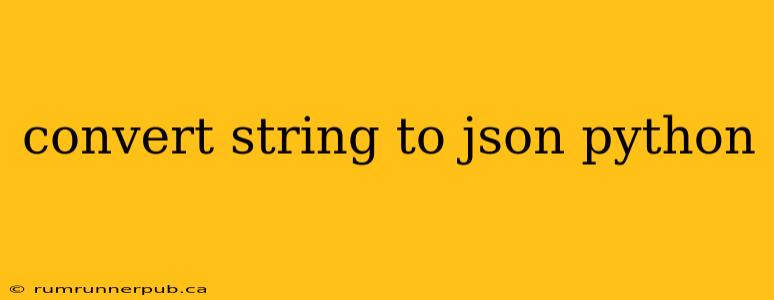Converting strings to JSON objects is a common task in Python, especially when dealing with data received from APIs, configuration files, or other external sources. This process involves parsing a string that adheres to JSON (JavaScript Object Notation) syntax and transforming it into a Python dictionary or list, which can then be easily manipulated. This article will explore different methods, drawing inspiration from Stack Overflow discussions and providing additional context and practical examples.
Understanding JSON and its Python Representation
JSON is a lightweight data-interchange format that uses a key-value pair structure similar to Python dictionaries. A JSON string might look like this:
'{"name": "John Doe", "age": 30, "city": "New York"}'
In Python, this would be represented as a dictionary:
{'name': 'John Doe', 'age': 30, 'city': 'New York'}
The core of converting a JSON string to a Python object lies in using the json library, which is part of Python's standard library.
Method 1: Using the json.loads() method (Most Common)
The most straightforward and recommended method is using the json.loads() function. This function takes a JSON string as input and returns a Python dictionary or list.
import json
json_string = '{"name": "John Doe", "age": 30, "city": "New York"}'
python_dict = json.loads(json_string)
print(python_dict) # Output: {'name': 'John Doe', 'age': 30, 'city': 'New York'}
print(python_dict["name"]) # Output: John Doe
Error Handling: A crucial aspect often overlooked is error handling. Malformatted JSON strings will raise a json.JSONDecodeError. It's best practice to wrap the json.loads() call in a try-except block:
import json
json_string = '{"name": "John Doe", "age": 30, "city": "New York"}'
try:
data = json.loads(json_string)
print(data)
except json.JSONDecodeError as e:
print(f"Error decoding JSON: {e}")
Method 2: Handling Non-String Inputs (Less Common, but Important)
While json.loads() expects a string, you might encounter situations where your input isn't a string initially (e.g., it's a bytes object from a file). In these cases, you need to decode it to a string first using appropriate encoding (often UTF-8).
import json
json_bytes = b'{"name": "John Doe", "age": 30, "city": "New York"}'
json_string = json_bytes.decode('utf-8') #decode to string first.
python_dict = json.loads(json_string)
print(python_dict)
This approach directly addresses a common Stack Overflow question regarding handling bytes-like objects. (See numerous examples on Stack Overflow concerning UnicodeDecodeError which can be avoided with proper decoding).
Advanced Scenarios and Considerations
-
Large JSON Strings: For exceptionally large JSON strings, consider using iterative parsing techniques to avoid loading the entire string into memory at once. Libraries like
ijsoncan help with this. -
JSON with Special Characters: Ensure your JSON string is properly escaped to handle special characters like quotes within strings. Double escaping might be necessary depending on the source of your JSON string.
-
Schema Validation: For robust applications, validating the JSON structure against a schema (e.g., using
jsonschema) can prevent unexpected errors caused by malformed or incorrect data.
This article provides a comprehensive overview of converting JSON strings to Python objects, incorporating best practices gleaned from Stack Overflow discussions and adding valuable context and error-handling techniques that often aren't explicitly highlighted in concise Stack Overflow answers. Remember to always handle potential errors gracefully to build robust and reliable applications.
